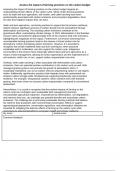Essay
Assess the impact of farming practices on the carbon budget.
- Module
- Water and Carbon
- Institution
- AQA
This pack contains two separate answers to the 2020 20-marker “Assess the impact of farming practices on the carbon budget. ” The pack contains the following; Resources PowerPoint containing two model answers at varying scores and level descriptor from mark scheme.
[Show more]



